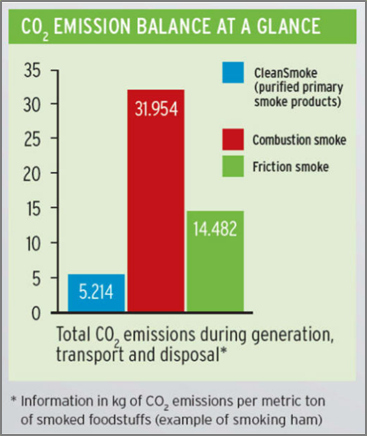Dear colleagues and friends in the European organic community
I have met many of you personally in recent months at the organic fairs in Spain, Italy, France and The Netherlands. Now the BioFach, the world‘s largest organic fair in Nuremberg, is just around the corner and it is exactly one year ago that Uwe Vogel, Chairman of the CleanSmoke Coalition, gave an impressive lecture on smoking without ashes, tar and PAHs.
The accompanying CleanSmoke Educational Campaign aims to establish, alongside conventional smoking, a smoking process that is scientifically recognised as healthy and environmentally-friendly in the implementing measures following the EU Organics Regulation. We want organic producers and organic consumers to be able to decide how they want to produce and consume – and we are convinced that the organic market will very quickly opt for smoking with purified smoke and in doing so, for added food safety.
Just one example of the many ecological advantages of this process in view of the impending climate catastrophe: with CleanSmoke smoking, CO2 emissions can be reduced by up to 80% compared to conventional smoking. The CleanSmoke smoke generation process was classified by the European Commission as Best Available Technique (BAT) and thus as the most environmentally friendly smoking process in December 2019, following preparatory work by the Joint Research Centre (JRC).
Further evidence that purified smoke, a purely physical smoke without additives, supports the requirements and objectives of organic farming can be found in the presentation from BioFach 2019 in addition to the fact sheet “CleanSmoke at a Glance”.
Consumers interviewed in a recent study by the renowned Rheingold Research Institute stated they would prefer clean and sustainably smoked products and favour producers applying these methods out of a sense of responsibility for their customers and the environment.

Nevertheless, the intended implementation of this healthy and environmentally-friendly smoking process in the EU Eco-Regulation –
incomprehensible for many – is difficult. An expert group (EGTOP)* commissioned to carry out the examination sees no need to recommend a procedure for inclusion in the implementing provisions of the EU Organics Regulation in addition to conventional smoking, despite the ecological advantages it too recognises.
EGTOP cites consumer protection as an argument — which is difficult to understand at this point: consumers, it is said, would not be able to distinguish whether the product was smoked conventionally or with the CleanSmoke process. Our proposal is quite simple: conventionally smoked organic products will continue to be declared with the addition “smoke”, while clean and sustainably smoked products with the addition “purified smoke”.
Jan Plagge, President of the German Bioland Association and the European IFOAM, made a trend-setting statement to the entire organic community during the Marketing Days of the Akademie Schloss Kirchberg at the end of last year: “In order to meet the climate targets, the organic sector must reduce enemy images and connect people.” Let me add: In times like these, it is not acceptable that an innovative organic processing method brought to the organic sector from outside should be rejected — and that a traditional smoking method for organic products, which has been demonstrated to be harmful to humans and the environment, should be used.
In this sense, we would like to ask you to continue to support us at national and European level so that the CleanSmoke smoking process for the processing of organic food is approved by the EU Committee on Organic Production (COP)**, which decides on this.
For further information on the CleanSmoke Educational Campaign and the CleanSmoke smoking process please contact us.
Jürgen Michalzik
4 February 2020
Project Leader
CleanSmoke
Educational Campaign
michalzik@jamconsult.de
*The expert group for technical advice on organic production (EGTOP) provides advice to European Institutions. It draws on outside experience to make sure that the EU rules on organics are effective and proportionate. Furthermore, as organics is a rapidly advancing and highly innovative sector, it ensures the EU keeps up to date with any technical advances in the field.
**The committee on organic production (COP) represents the views of EU countries on current and upcoming organic legislation. It therefore serves as a key link between the EU and its constituent countries. It meets regularly to discuss any proposed changes to the current set of rules. It comprises representatives of all EU countries and a Commission representative as chairperson.
